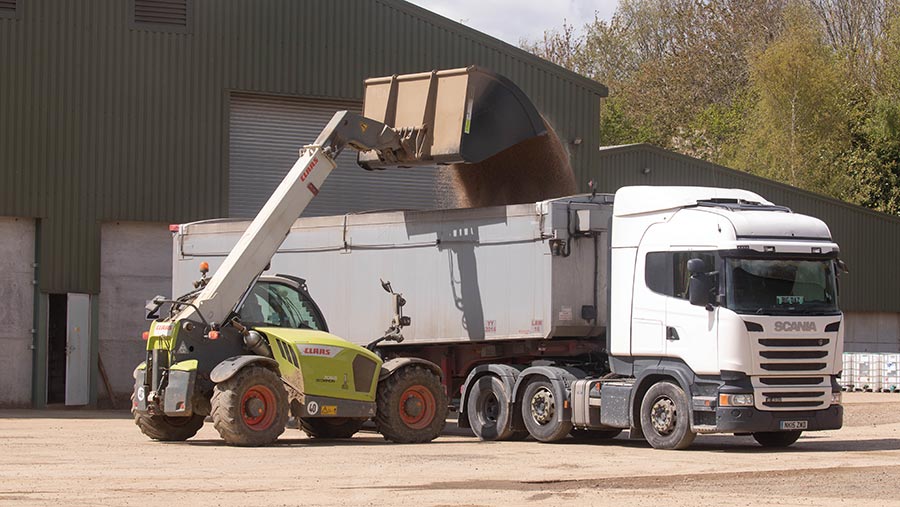Call for new grain assurance system to end ‘double standards’
 © Tim Scrivener
© Tim Scrivener A group of farmers has suggested solutions to the “double standards” that allow grain importers easier access to UK feed mills than domestic food producers.
The group, co-ordinated by East Yorkshire farmer Stephen Ridsdale, say they have not received a logical explanation from the Agricultural Industries Confederation (AIC) or Red Tractor (RT) why they cannot have the same methods for assuring grain than those afforded to imports.
They are calling for a pesticide declaration box to be added to the grain passport to confirm UK grain is safe.
See also: UK growers dismayed over ‘double standards’ of feed mills
The AIC allows grain imports through either pesticide residue testing, or a pesticide declaration to confirm that the grain was grown using only EU-licensed pesticides.
This contrasts with the AIC’s requirement that to access Universal Feed Assurance Scheme (UFAS) feed mills, UK growers must adhere to farm level assurance protocols, such as Red Tractor or Scottish Quality Crops.
Two-tier system
“There should be nothing stopping the existence of the pesticide declaration box for UK grain, to create two voluntary standards working in tandem to serve different aspects of the marketplace,” said Mr Ridsdale.
“Some growers only produce feed grains, and they should have access to the feed mill markets by the same methods as imports enjoy, and not be forced to have the extra cost burden of farm level assurance from schemes such as RT.
“It’s crazy that it is more difficult for UK growers to access their own markets compared to imports.”
Mr Ridsdale noted that domestic laws require sprayer operators to hold certificates of competence to apply pesticides, and spraying operations to be undertaken with National Sprayer Testing Scheme (NSTS) tested sprayers. Local authorities also check farm compliance with grain drying and storage rules, and they are also at liberty to inspect pesticide records.
“It’s a risk-based system accepted by government to ensure pesticide levels in grain are within food safety limits. It works, and negates the need to routinely pesticide residue test, in exactly the same way that RT grain does not need to be residue tested.”
Farm inspections
AIC-approved merchants under the Trade Assurance Scheme for Combinable Crops (TASCC) are welcome to visit farm grain stores at any time to check hygiene procedures, inspect machinery and fields.
However, the AIC does not require any on-farm checks of imported feed grain, which is often blended with domestic grain and used to feed RT-assured livestock.
“Presumably AIC and RT are content that imported combinable crops fed to RT assured livestock are in no way poisonous, harmful, or a food safety concern to our farmed livestock or the end consumer,” said Mr Ridsdale.
“If imported crops are safe, then there’s absolutely no reason why UK grain cannot be assured by the same methods as imports.”
Tenant farmer Robbie Dean, who farms 280ha on the Cambridgeshire-Suffolk border, said it was “farcical” that farmers must pay to access their own markets.
“I’m quite a small tenant farmer. I can’t afford these grain registrations,” he said. “No-one cares more about keeping rats out of grain stores than me.
“Red Tractor doesn’t materially alter anything I do. Any grain grown in this country is safe anyway – it’s all tested at intake.”
‘Pay a premium’
Ian Bennett, who farms 300ha in Prescott, Merseyside, said: “I think a self-declaration form is really all we need, then our standards are still higher than imports.
“Most areas Red Tractor tests for are legal requirements, so there’s no need for an independent test because we cannot buy illegal chemicals.”
But he added: “I’m not against Red Tractor having a place, if the consumer wants it and is prepared to pay a premium.”
Red Tractor and AIC review under way
Red Tractor said the subject of a two-tier system has been raised at its crops sector board.
While some of the grower representatives expressed concerns at moving to such a system because of the added complexity, it was agreed that the topic required more analysis.
A Red Tractor spokesman said an industry working group, chaired by NFU vice-president Tom Bradshaw and including Red Tractor and the AHDB, has been formed to establish the facts on imported grain standards and compliance.
“Once this work is concluded, the findings will be fed back to Red Tractor, so that an informed decision can be made.”
The Agricultural Industries Confederation (AIC) says the UK livestock feed industry is heavily reliant on UK-grown cereals and other feed materials to produce safe and traceable feed for UK livestock farmers.
However, on occasions when UK supplies for cereals are hit by unfavourable weather, such as the 2020 harvest, the feed industry has to source a proportion of cereals from overseas.
Feed companies then purchase imported cereals through a gatekeeper, or on a gatekeeper basis, and ensure that products are safe for use and comply with assurance requirements and relevant legislation.

